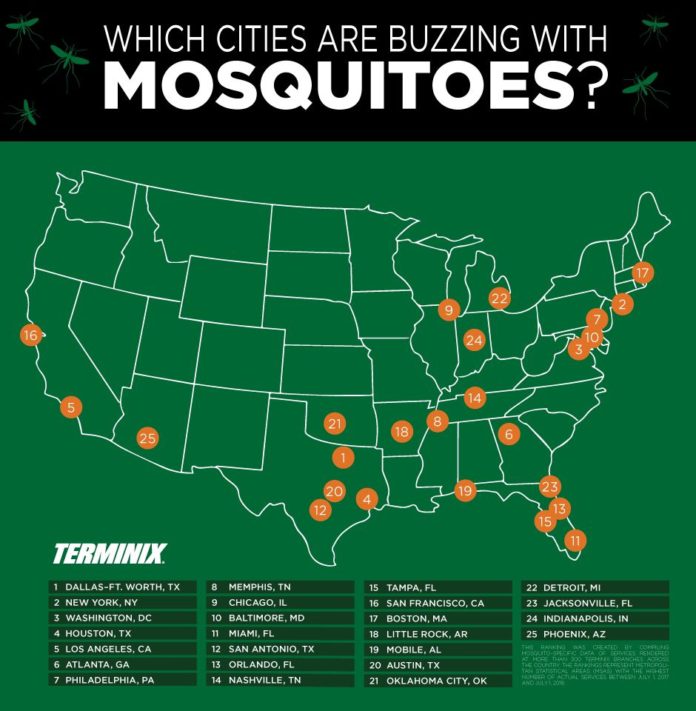It’s time to do a fist pump as Dallas-Fort Worth is No. 1 again! On second thought, you might lower that fist, as it might get bitten by a mosquito.
In recognition of World Mosquito Day, Memphis-based Terminix, a provider of termite and pest control services and a ServiceMaster (NYSE: SERV) company, has announced its list of 25 cities pestered the most by mosquitoes. Yeah, it bites, but the Dallas-Fort Worth area topped the list for the second consecutive year, followed by New York City, Washington, D.C. and Houston. While many in the United States think of mosquitoes as little more than nuisances that cause itchy red bumps, they can transmit serious diseases—including the West Nile virus—and globally, they are vectors for deadly illnesses including malaria, according to the news release.
Forget about sharks (even the Meg), killer bees, bears, spiders and snakes, according to the World Health Organization, mosquitoes are the world’s deadliest animal.
The top mosquito cities list was determined by examining data regarding Terminix services rendered by branches across the United States between July 1, 2017 and July 1, 2018*. Texas and Florida lead the nation, each with four cities on the list, followed closely by California and Tennessee. The full list of the top 25 cities is:
1. Dallas-Fort Worth
2. New York City
3. Washington, D.C.
4. Houston
5. Los Angeles
6. Atlanta
7. Philadelphia
8. Memphis, Tenn.
9. Chicago
10. Baltimore
11. Miami
12. San Antonio
13. Orlando, Fla.
14. Nashville, Tenn.
15. Tampa, Fla.
16. San Francisco
17. Boston
18. Little Rock, Ark.
19. Mobile, Ala.
20. Austin, Texas
21. Oklahoma City
22. Detroit
23. Jacksonville, Fla.
24. Indianapolis
25. Phoenix
“At Terminix, our passion is protecting our customers from mosquitoes,” said Matt Stevenson, president, Terminix Residential. “From treating a backyard oasis to a one-time mosquito service in preparation for an event, we ensure these problem pests are no longer an issue.”
Homeowners can take steps to limit the number of mosquitoes in their backyards. Decrease the availability of potential breeding sites through the following means, and consult a professional for mosquito control for additional help:
1. Remove sources of standing water. Some mosquitoes need standing water in order to lay their eggs. Removing open containers, buckets, plastic sheeting or covers, and tires filled with water can help reduce the breeding sites in your yard.
2. Clean the gutters. It’s also important to maintain your gutter system. Leaves and other debris can build up in your gutters and downspouts, leading to water retention.
3. Change water sources weekly. Emptying or replacing the water in outdoor pet bowls, fountains, birdbaths, rain barrels and plant containers often will help break the mosquito breeding cycle.
4. Replace outdoor lighting. Mosquitoes, like many insects, can be attracted to light. Special bulbs called “bug lights” emit a different type of light than typical light bulbs. Replacing outdoor lighting with these “bug lights” can help attract fewer mosquitoes.
*This ranking was created by compiling mosquito-specific data of services rendered at more than 300 Terminix branches across the country. The rankings represent Metropolitan Statistical Areas (MSAs) with the highest number of actual services between July 1, 2017 and July 1, 2018.






